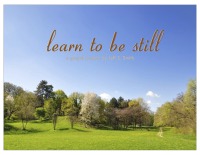Learn to Be Still
 Wednesday, May 23, 2012 at 1:58PM
Wednesday, May 23, 2012 at 1:58PM  We live in such a noisy world. Many of us, when confronted with an empty, silent house, will instinctively turn on the television just to fill the void, even if we ignore the program. There are very few truly quiet moments in our days anymore, but quietness has value in allowing us to hear God better and to adopt a manner that exudes gentleness and meekness.
We live in such a noisy world. Many of us, when confronted with an empty, silent house, will instinctively turn on the television just to fill the void, even if we ignore the program. There are very few truly quiet moments in our days anymore, but quietness has value in allowing us to hear God better and to adopt a manner that exudes gentleness and meekness.
Discussion
I. Just Another Day in Paradise
A. Finding Happiness Over That Green Hill
1. Elijah did not appear to learn the lesson of the still, small voice of God, preferring instead perhaps to find his Lord in the dramatic earthquake or whirlwind, or fire (First Kings 19:9-18)
2. our God is the God of the mustard seed, of the few, of salvation on a cross, rather than in a palace
3. Elijah, one of the greatest men ever to live, and one of the bravest ever to serve God so prominently, came up short when discouragement and depression enveloped him in pessimism and defeat
4. God wanted to give him victory, but Elijah needed spectacle; that is the green hill over which we often imagine happiness is hiding, but faithful obscurity is nobler than seeking the spotlight
B. Like Sheep Without a Shepherd
1. God is our refuge and strength and we owe him our respect, loyalty, and attention (Psalm 46:1-11)
2. be still – stop complaining, stop arguing, stop speculating, stop self-seeking, stop demanding, stop imprecating, stop making contingencies in case he fails
3. be still and know God is our refuge and he will never fail, that we are sheep being shepherded by someone who cares enough to quiet the storms and waves that threaten us
C. Following the Wrong Gods Home
1. in the end, we are trying to learn to be still in the presence of a worthy God, as opposed to the noisy, but ultimately, futile wrong gods that compete for attention by promising instant gratification or promoting temporary tangibility (Habakkuk 2:18-20)
2. learn to be still enough to comprehend the will of a true God, to accept a role of subjection, and to dethrone the wrong gods – pride, wealth, fame, pride, self, and pride
II. Gentle and Quiet
A. The Flowers in Your Garden
1. although it is politically incorrect and many churches have found ways around it, the New Testament requires male leadership, both in the home and in the congregation
a. they are not commanded to keep absolute silence, for they must sing, profess their faith, and confess their sins, but must maintain a spirit of submissiveness and respect for the divine order (First Corinthians 14:26-35, 11:2-3)
b. a distinction is made between the genders (First Timothy 2:8-15)
2. many people find feminine beauty defined by filling out a swim suit, or the highness of cheekbones, silkiness of blonde hair, or her value defined by assertiveness and sexuality, but “Charm is deceitful, and beauty is vain, but a woman who fears the LORD is to be praised” (Proverbs 31:30).
3. the Holy Spirit placed value in qualities that are growing scarce even among believing women in our gender-neutral culture (First Peter 3:1-6)
B. So Many Contradictions
1. our culture tends to reward the abrasive and assertive, reserving doubt and disdain for people with enough confidence and strength to exercise restraint and self-control, and to turn the other cheek when slapped or insulted
2. the wisdom from below says to get yours first, to get back at all those who wrong you, to even the score, but the wisdom from above calls for patience and an end to the quest for vengeance (James 3:13-18)
3. in the church at Corinth, within a culture much like ours, the members would even take one another to court (First Corinthians 6:1-8)
C. Keep on Running
1. running the Christian race can be done without a spirit of competitiveness, because God has enough crowns for all the winners
2. what matters more than getting there first is helping someone else break the tape, too, and not projecting such a self-centered or negative attitude that we dissuade them from even beginning the race
a. Jesus said, “Take my yoke upon you, and learn from me, for I am gentle and lowly in heart, and you will find rest for your souls” (Matthew 11:29).
b. Paul, who could be as forceful as a bear when dealing with hypocrites, compared his gentleness to that of a nursing mother when dealing with the weak and struggling (First Thessalonians 2:5-8)
3. discipleship requires the development of a different kind of spirit
a. peaceful and quiet, godly and dignified (First Timothy 2:1-2)
b. gentle and courteous (Titus 3:1-3)
Conclusion
For some people, adopting this kind of attitude requires a massive overhaul of the personality, but it is worth the effort to live the kind of life that reflects divine glory and pursues it eternally.
Questions for Review
- What did God illustrate with the still, small voice?
- From what specifically is God our refuge?
- How does Jehovah differ from modern idols?
- How must women keep silent in the churches?
- What is meekness? How does it act and react?
- What is the wisdom from above like?
- Give some examples of courtesy.
 Jeff Smith
Jeff Smith


